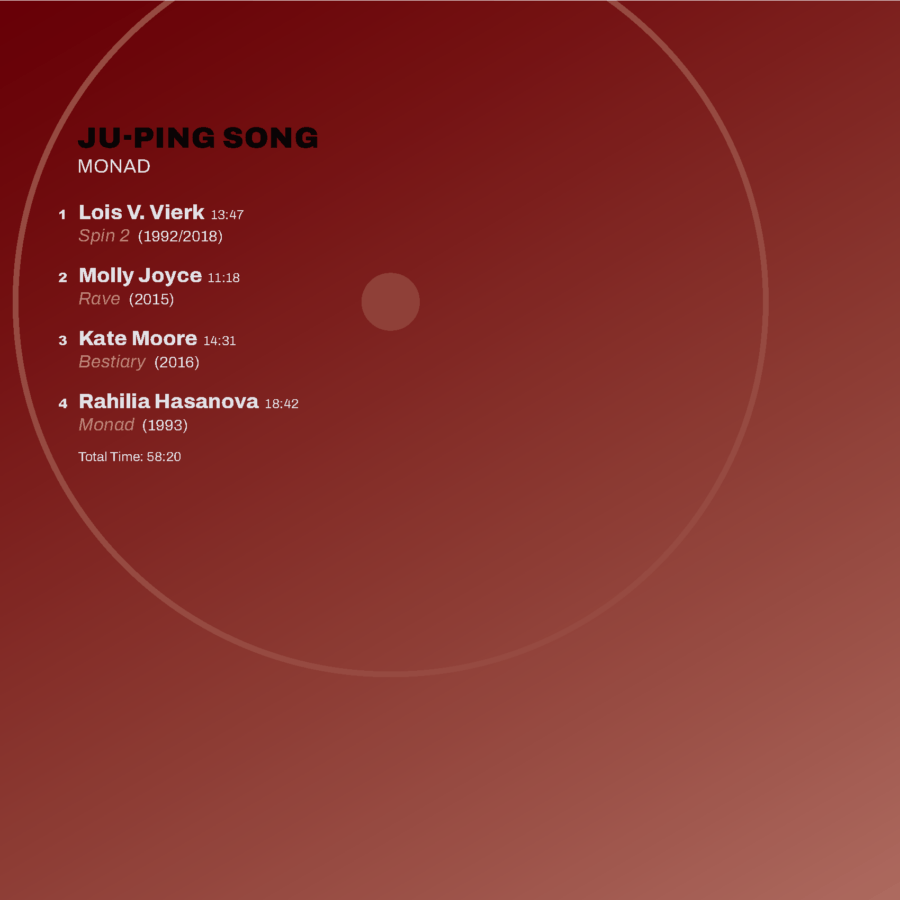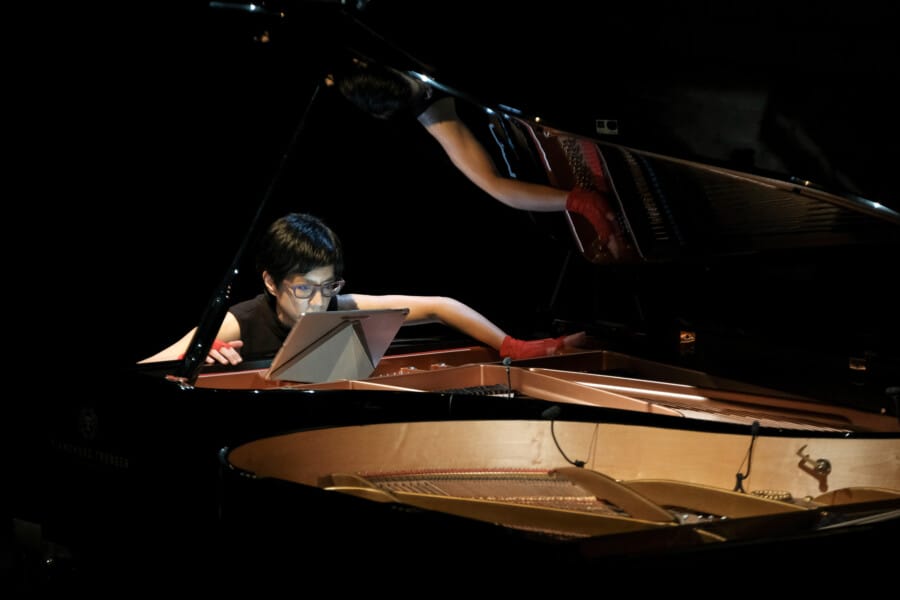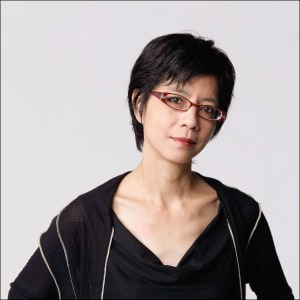In her debut solo album, Ju‑Ping Song presents four powerful two-piano works in a “thoroughly engaging” release that reflects her “formidable pianism and artistry” (Jed Distler).
“An extraordinary pianist”
– Boston Globe
The CD opens with Lois V Vierk’s Spin 2 (1992/2018), “a masterpiece of canny construction and unfettered emotion that deserves a central place in the international canon of works for two pianos” (Distler). By multitracking both piano parts, Song creates an “ideal interpretation, where Vierk’s carefully scaled dynamic gradations, interlocking clusters, and gorgeous pedal effects emerge with unprecedented clarity” (Distler). Spin 2 was commissioned and premiered by Ursula Oppens and Frederic Rzewski, and this album features the premiere recording of Vierk’s 2018 arrangement.

Anyone can download the release’s 8-page PDF booklet,containing:
an introduction by Jed Distler; descriptions of each piece; bios; more.
Buyers at Bandcamp will automatically receive the PDF booklet.
Molly Joyce’s Rave (2015) weaves a tapestry of acoustic and electronic materials. She explains that the work “incorporates an inverse relationship between live piano and pre-recorded electronics, exploring the sonic possibilities of this complex relationship as it evolves over the course of the piece. As the piece progresses, these separate and unusual inverse roles of the live piano and electronics gradually cross to ultimately supplant each other by assuming their more anticipated roles.”
In Kate Moore’s intense Bestiary (2016), she explores “endlessly repeating and changing chords, activating the hammers against vibrating strings, pushing the playing to seemingly impossible speeds. The struggle to maintain constant acceleration, deceleration, and rhythmic morphing without pause for fifteen minutes creates an accumulation of tension and expectation in both pianist and listener that heightens the emotional power of her music” (Song).
The CD concludes with the premiere recording of Rahilia Hasanova’s angry Monad, a composition that reflects the horrors Hasanova witnessed during the 1990 January Massacre of Baku’s civilian population by the Russian army, during which she saw one of her neighbors killed. “A work of seriousness and substance” (Distler). Song, who gave the New York premiere, comments:
“It is caustic, emotional, wild, and full of the faded songs and harmonies of Azerbaijani culture. Written in Western notation, the music keeps wanting to burst out of its constraining note heads, rhythms, structures, run far and fast, and scream. It takes the pianist with it, willingly or not. It is music with a passion that cannot be contained; it is wild; it is raw; it is powerful and devastating.”

Ju-Ping Song

Ju-Ping Song, internationally recognized as one of today’s champions of contemporary music, has inspired the creation of new works by both emerging under-40 composers as well as more established names. She has been a guest artist at the Darmstadt Contemporary Music Workshop, Tanglewood Music Center, Akyoshidai New Music Festival, Omaha Under the Radar, New Music Gathering, Cleveland Uncommon Sound Project, and the Center for New Music (San Francisco). Song is the founder and artistic director of NakedEye Ensemble, a flexible new music group based in Lancaster, Pennsylvania, dedicated to promoting works by living composers.
Composer Biographies
Lois V Vierk (b. 1951) has spent most of her career in New York City. Among the many performers and presenters who have commissioned her music are pianists Ursula Oppens, Frederic Rzewski, Aki Takahashi, Claudia Rüegg, and Margaret Leng Tan, accordionist Guy Klucevsek, the Kronos Quartet, Lincoln Center Festival, Bang on a Can Festival, and Ensemble Modern. Her music has been praised as “thrilling” (The New Yorker), “genuinely exciting” (New York Times), “fascinating and often beautiful” (San Francisco Chronicle), and “rapturous” (Chamber Music Magazine). Vierk studied composition with Mel Powell, Leonard Stein, and Morton Subotnick, and studied Gagaku with Suenobu Togi at UCLA and Sukeyasu Shiba in Tokyo.
Molly Joyce (b. 1992) is one of the “most versatile, prolific, and intriguing composers working under the vast new-music dome” (Washington Post), creating music of “serene power” (New York Times). Her works have been commissioned and performed by ensembles including the Minnesota, Vermont, New World, New York Youth, Pittsburgh, Albany, and Milwaukee Symphony Orchestras. Joyce’s projects have been presented and commissioned by Carnegie Hall, SXSW EDU, TEDxMidAtlantic, Hirshhorn Museum and Sculpture Garden, Bang on a Can Marathon, and National Sawdust. Joyce is a graduate of The Juilliard School, Royal Conservatory in The Hague, and Yale School of Music, and she has studied with Samuel Adler, Martin Bresnick, David Lang, Missy Mazzoli, and Christopher Theofanidis.
Kate Moore (b. 1979) is an internationally acclaimed composer whose works have been performed by Holland’s Asko|Schönberg, Bang on a Can All-Stars, Icebreaker, Slagwerk Den Haag, Ensemble Offspring, the Australian String Quartet, The Netherlands Radio Philharmonic Orchestra, and Groot Omroepkoor. She has received the Gieskes-Strijbis Podium Prize as well as the Matthijs Vermeulen Prize (for composition), and has been awarded fellowships from the MacDowell Colony, Yaddo, Tanglewood, Civitella Ranieri, and the 2001 Franco-Australian Composition Competition. She holds a doctorate from the Sydney University Conservatorium of Music, a master’s from The Royal Conservatory of The Hague, and an honours degree from the Australian National University.
Rahilia Hasanova (1951-2024), born in Baku, Azerbaijan, was one of her country’s most prolific and influential female composers. She combined the essence of her native culture and traditional music with contemporary classical music traditions from the West, creating a unique and diverse body of work. Hasanova’s compositions span a wide range of genres and instrumentation, from chamber music and symphonic works to opera and ballet. Her music has been performed at international festivals and concerts across the globe, including in Russia, Ukraine, Belarus, Switzerland, Italy, Belgium, and Austria. In 2009, Hasanova permanently moved to the US, where she continued to compose, perform, and organize concerts until her death in August 2024. “Hasanova’s music is phenomenal; she is a great master” (Krzysztof Meyer).







